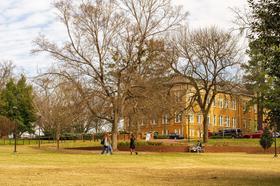Serving 36 students in grades 10-12, Lubbock-cooper New Hope Academy ranks in the top 30% of all schools in Texas for overall test scores (math proficiency is top 30%, and reading proficiency is top 30%).
The percentage of students achieving proficiency in math is <50% (which is higher than the Texas state average of 41%). The percentage of students achieving proficiency in reading/language arts is ≥50% (which is higher than the Texas state average of 42%).
The student-teacher ratio of 7:1 is lower than the Texas state level of 14:1.
Minority enrollment is 36% of the student body (majority Hispanic), which is lower than the Texas state average of 75% (majority Hispanic).
Quick Facts (2026)
- School Type: Alternative school
- Grades: 10-12
- Enrollment: 36 students
- Student-Teacher Ratio: 7:1
- Minority Enrollment: 36%
- Graduation Rate: 85-89% (Btm 50% in TX)
- Math Proficiency: <50% (Top 1%)
- Reading Proficiency: ≥50% (Top 1%)
- Science Proficiency: <50% (Top 50%)
- Source: National Center for Education Statistics (NCES), TX Dept. of Education
Top Rankings
Lubbock-cooper New Hope Academy ranks among the top 20% of public schools in Texas for:
Category
Attribute
Community Size
School Overview
Lubbock-cooper New Hope Academy's student population of 36 students has declined by 65% over five school years.
The teacher population of 5 teachers has declined by 16% over five school years.
School Type
Grades Offered
Grades 10-12
Total Students
36 students
Gender %
Total Classroom Teachers
5 teachers
School Rankings
The diversity score of Lubbock-cooper New Hope Academy is 0.50, which is less than the diversity score at state average of 0.64. The school's diversity has stayed relatively flat over five school years.
Math Test Scores (% Proficient)
(21-22)<50%
41%
Reading/Language Arts Test Scores (% Proficient)
(20-21)≥50%
42%
Science Test Scores (% Proficient)
<50%
46%
Student-Teacher Ratio
7:1
14:1
American Indian
3%
n/a
Asian
n/a
6%
Hispanic
30%
53%
Black
3%
13%
White
64%
25%
Hawaiian
n/a
n/a
Two or more races
n/a
3%
All Ethnic Groups
Graduation Rate
85-89%
90%
Participates in the National School Lunch Program (NSLP)
Yes
Eligible for Free Lunch
28%
57%
Eligible for Reduced Lunch
6%
5%
School Statewide Testing
School District Name
Source: National Center for Education Statistics (NCES), TX Dept. of Education
Profile last updated: 02/09/2025
Frequently Asked Questions
What percent of students have achieved state testing proficiency in math and reading?
<50% of students have achieved math proficiency (compared to the 41% TX state average), while ≥50% of students have achieved reading proficiency (compared to the 42% TX state average).
What is the graduation rate of Lubbock-cooper New Hope Academy?
The graduation rate of Lubbock-cooper New Hope Academy is 85-89%, which is lower than the Texas state average of 90%.
How many students attend Lubbock-cooper New Hope Academy?
36 students attend Lubbock-cooper New Hope Academy.
What is the racial composition of the student body?
64% of Lubbock-cooper New Hope Academy students are White, 30% of students are Hispanic, 3% of students are American Indian, and 3% of students are Black.
What is the student-teacher ratio of Lubbock-cooper New Hope Academy?
Lubbock-cooper New Hope Academy has a student ration of 7:1, which is lower than the Texas state average of 14:1.
What grades does Lubbock-cooper New Hope Academy offer ?
Lubbock-cooper New Hope Academy offers enrollment in grades 10-12
What school district is Lubbock-cooper New Hope Academy part of?
Lubbock-cooper New Hope Academy is part of Lubbock-Cooper Independent School District.
School Reviews
Review Lubbock-cooper New Hope Academy. Reviews should be a few sentences in length. Please include any comments on:
- Quality of academic programs, teachers, and facilities
- Availability of music, art, sports and other extracurricular activities
Recent Articles

Year-Round Schooling in 2026: Updated Parent Guide
Explore the latest 2026 data, trends, costs, and parent planning tips in the ongoing debate over year-round schooling vs the traditional calendar.

No Child Left Behind: Past, Present, and Future of U.S. School Policy
Explore how No Child Left Behind evolved into ESSA, what it means for 2025‑26 schooling, and what parents need to know about testing, admissions planning, and funding.

Understanding Public School Fees & Optional Costs Guide
Discover what public school fees are required versus optional, with 2026 updates for parents, students, and educators on budgeting and planning.





